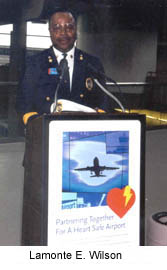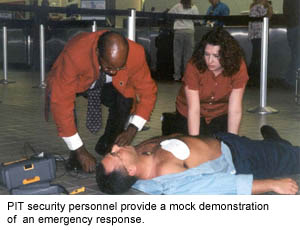Pittsburgh International Airport launches AED program
June 11, 2001
 Pittsburgh International Airport (PIT), recently ranked Number One in the U.S. and Number Three in the world by the readers of Conde Naste Traveler Magazine, may now be one of the safest airports in the nation, thanks to its new public access defibrillation (PAD) program, announced June 11th. PIT joins a small--but growing--number of international airports that have installed defibrillators and trained likely users, with the expectation that this will increase survival rates among victims of sudden cardiac arrest (SCA).
Pittsburgh International Airport (PIT), recently ranked Number One in the U.S. and Number Three in the world by the readers of Conde Naste Traveler Magazine, may now be one of the safest airports in the nation, thanks to its new public access defibrillation (PAD) program, announced June 11th. PIT joins a small--but growing--number of international airports that have installed defibrillators and trained likely users, with the expectation that this will increase survival rates among victims of sudden cardiac arrest (SCA).
Research suggests that airports have a relatively high incidence of SCA, compared with other public locations. SCA victims who are treated with a defibrillator within a few minutes of collapse have the greatest chance of survival.
According to airport spokespersons, Kent George, Executive Director of the Allegheny County Airport Authority, and Chief Lamonte Wilson, Allegheny County Airport Authority Fire, more than two-dozen automatic external defibrillators (AEDs) have been placed throughout the airport. Hundreds of people who work at the airport have been trained in cardiopulmonary resuscitation (CPR) and in AED use. They include security and safety personnel, airport police, information clerks and volunteer shop vendors. In addition, flight attendants and other personnel from most major airlines servicing the airport are trained in CPR and AED use.
The AEDs are placed in well-marked locations to facilitate quick public access of the devices in case of an emergency. Experience from other airport PAD programs, such as the first such program, at Chicago’s O’Hare International Airport, suggests that even laypersons with no prior training have been able to use the devices successfully and help save lives.
 "With the airport achieving international status, it is even more important that there is access to early defibrillation," said Tom Pangburn, MD, Prehospital Medical Director, Heritage Valley Health System and the PIT PAD Medical Director. "With the volume of people traveling through this airport, there is a good chance that about 10-20 people will suffer sudden cardiac arrest in the next year. Many more people will suffer chest pain (a symptom of a heart attack, which can lead to sudden cardiac arrest) and they will have a better chance for early intervention. In the coming years, thanks to this new program, many more people are likely to survive."
"With the airport achieving international status, it is even more important that there is access to early defibrillation," said Tom Pangburn, MD, Prehospital Medical Director, Heritage Valley Health System and the PIT PAD Medical Director. "With the volume of people traveling through this airport, there is a good chance that about 10-20 people will suffer sudden cardiac arrest in the next year. Many more people will suffer chest pain (a symptom of a heart attack, which can lead to sudden cardiac arrest) and they will have a better chance for early intervention. In the coming years, thanks to this new program, many more people are likely to survive."
H. Woodruff "Woody" Turner, 60, a business traveler and SCA survivor, is among those who applaud the idea. He was on hand during the official launch to commend PIT for its foresight in implementing the PAD program. Turner, an attorney and volunteer firefighter suffered SCA in the fall of 1999 while fighting a fire. Emergency medical services personnel were able to resuscitate him at the scene. The next day he underwent a cardiac catheterization and later, successful bypass surgery. Today he feels "110 percent," and as a frequent traveler, is relieved to know that PIT is well-prepared to handle future cardiac emergencies.
Vince Mosesso, MD, Chairman of the American Heart Association’s Operation Heartbeat and Medical Director for the National Center for Early Defibrillation at the University of Pittsburgh, also was on hand to offer support for the initiative.
"We commend the staff and management team of the Pittsburgh International Airport for implementing its new public access defibrillation program," said Mosesso. "This will greatly facilitate delivery of rapid defibrillation by bystanders, which in most cases of sudden cardiac arrest must occur for a victim to survive. It is our hope that Pittsburgh, once declared the ‘City of Champions’ and ‘America’s Most Livable City,’ may one day become known as the ‘City of Survivors’."
